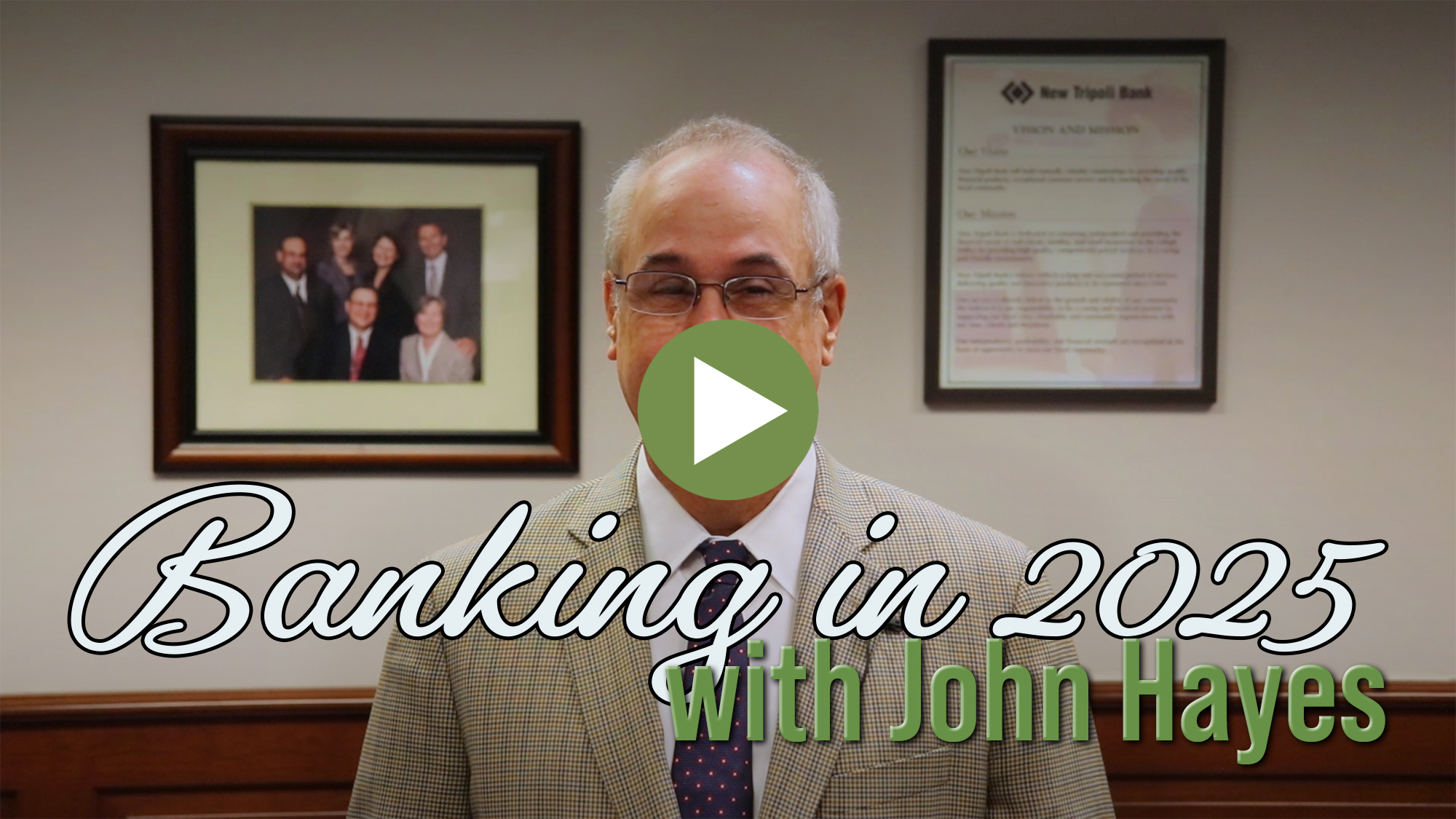 Earlier this year, the Board of Directors of New Tripoli Bank announced Sundra Sherwin's promotion to Senior Vice President, Branch Administration. Sundra has been with New Tripoli Bank for over 18 years and has over 26 years’ experience in the banking industry. She joined the Bank in 2007, beginning her career as a Teller. Sundra has held many additional roles over the years, including Head Teller, Customer Service Representative and Relationship Banker. In 2014, Sundra was promoted to Assistant Vice President/Branch Manager, and since 2018 had held the title of Vice President, Branch Administration.
Earlier this year, the Board of Directors of New Tripoli Bank announced Sundra Sherwin's promotion to Senior Vice President, Branch Administration. Sundra has been with New Tripoli Bank for over 18 years and has over 26 years’ experience in the banking industry. She joined the Bank in 2007, beginning her career as a Teller. Sundra has held many additional roles over the years, including Head Teller, Customer Service Representative and Relationship Banker. In 2014, Sundra was promoted to Assistant Vice President/Branch Manager, and since 2018 had held the title of Vice President, Branch Administration.
Commenting on Sundra's promotion, John Hayes said, “Sundra has been an invaluable part of maintaining New Tripoli Bank’s positive relationship with its customers. She’s done an amazing job at organizing and motivating the Bank’s retail staff, preparing the next generation of community bankers and branch managers that will carry the Bank into the future.”
If you and your children have a mobile phone, you’ve probably received texts from friends and family. If you’ve opted in to receive texts from retailers, you get these too. But what do you do when you receive a text, and you question the source?
The answer matters because your response to a questionable text might keep you safe from a scammer — or lead you into a trap.
Text Message Scams on the Rise
New data from the Federal Trade Commission (FTC) shows that in 2024, “consumers reported losing $470 million to scams that started with text messages. This amount is five times higher than what was reported in 2020, even though the number of reports declined.”
How Text Scams Work
Below is a simplistic example of how a spoofed message can be sent to you.
Step One. Threat actors obtain your phone number on the Dark Web or generate your number with an auto-dialer tool.
Step Two. The scammer creates a message. Many scam texts sound urgent to get victims to react without thinking — “invoice overdue” or “your account has been breached” are common ruses.
Step Three. The scammer sends the text and hopes you bite.
Prevention Tips
- Don’t reply to unexpected text messages. The text may push you to react quickly, but it’s best to stop and think it through.
- Never click links in unexpected messages. You might download malicious software (malware) that will compromise your device, and scammers often create real-looking websites to draw you deeper into the trap.
- Don’t assume a text from a known company or organization is legit. Double-check by contacting the company. Don’t use information from the text — get a phone number or email address from the company’s website.
Filtering Unwanted Texts
There are many ways to filter unwanted text messages or stop them before they reach you.
| On your phone | Your phone may have an option to filter and block spam or messages from unknown senders. Here’s how to filter and block messages on an iPhone and how to block a phone number on an Android phone. |
| Through your wireless provider | Your wireless provider might have a tool or service that lets you block calls and text messages. Check out ctia.org, a website from the wireless industry, to learn about options from different providers. |
| With a call-blocking app | Go to ctia.org for a list of call-blocking apps for Android, BlackBerry, Apple, and Windows phones, or search for an app online. Check out the features, user ratings, and expert reviews. |
Take Action – Report Texts
- Forward spam messages to 7726 (SPAM). This helps your wireless provider spot and block similar messages.
- Report potential scams on either the Apple iMessages app or Google Messages app for Android users.
- Report potential scams to the FTC at ReportFraud.ftc.gov.
If you’ve lost money to a scam, reach out to the company that transferred the money right away to see if there’s a way to get your money back. Then report the scammer at ReportFraud.ftc.gov.
If You’re a Victim?
Immediately change any passwords you might have revealed. Consider reporting the attack to IC3.gov and the police, and file a report with the Federal Trade Commission.
Getting Help
If you identify suspicious activity involving your financial institution, contact them immediately.
*Information provided by the Financial Services Information Sharing and Analysis Center (FS-ISAC).
In order to combat a rise in property and mortgage fraud in Lehigh County, the Clerk of Judicial Records has released a new, free alert system for residents of Lehigh County.
The program is called Record Alert and it allows any resident in the county, or anyone with property in Lehigh County, to receive alerts via text or email when a document is recorded involving their property.
The Recorder of Deeds office is required to record any document that is presented to their office when all the required data is properly executed and payment is received alongside the document. Once a fraudulent document is recorded, the fraudster may use your name as collateral on a mortgage or attempt to sell your home to an unsuspecting buyer. There is no way for the Recorder of Deeds office to know that the document is being used for fraudulent purposes without being alerted by the legitimate property owner.
By registering for Record Alert, you will receive alerts when a document is recorded which involves your property. The notification will come via text or email stating the parcel number, instrument number, document type, and the date it was recorded. You can then contact the Recorder of Deeds and inform them of the fraudulent document before the criminal can use your name or property.
This service also allows you to monitor the status of legitimate documents that you've filed with Lehigh County, such as after you finish with a closing, or when you take out or pay off a mortgage.
Residents of Lehigh County can register for this free service at https://www.landex.com/recordalert/lehigh
by Chelsea Grohgans
 In today’s fast paced world, passive income has become a growing trend. It allows for more financial freedom, while not having to be chained to the normal 9 to 5 workday. But what exactly is passive income, and how can your bank help you generate it?
In today’s fast paced world, passive income has become a growing trend. It allows for more financial freedom, while not having to be chained to the normal 9 to 5 workday. But what exactly is passive income, and how can your bank help you generate it?
These are the questions I intend to explore in this blog article, highlighting practical ways you can start building passive income, and discussing the various financial products and services that can help you achieve your goal of financial freedom!
What is Passive Income?
Passive income is money earned with minimal ongoing effort after an initial investment of time, money, or resources. Unlike active income, such as a salary earned by spending hours working for an employer or money earned through self-employment, passive income flows in even when you’re not actively working—like when you’re sleeping or on vacation! While this requires an upfront investment of time and/or capital, the goal is to create streams of revenue that eventually require little to no attention after the initial set up.
How to Earn Passive Income
There’s no one-size-fits-all path to reaching a point where you can live partially or entirely off passive income. You’ll want to try different strategies to find those that fit your lifestyle and needs. If you’re looking for a place to start, here are some strategies you could consider:
CD’s, Money Market and Savings Accounts – Don’t overlook the power of compound interest! Whether you’re saving a small amount or a small fortune, any amount of money has the ability to earn interest at a guaranteed rate. Unlike more volatile assets, after your initial account opening, these products typically require little to no effort to watch your savings grow. New Tripoli Bank offers a variety of savings products that can help you get started earning interest with your existing savings.
Rental Properties – Real estate can be a powerhouse for passive income, provided you have the capital to invest. Buy a property, rent it out and collect the monthly checks. Unlike the previous example, rental properties are not fully hands off. Your properties will need repairs, and you will need to manage your relationship with your tenants. If you have the flexibility to do so, you can always hire a property management company to help lighten the load.
Stock Market Investments – Investing in stocks or Exchange Traded Funds (ETF’s) that pay dividends is a straightforward way for you to earn passive income. You buy shares in a company, and those companies regularly pay back a portion of any profits they may make. To make the most of your dividends, you could store them in a savings or money market account and earn interest while you plan your next investment move!
Online Content Creation – Do you have a knack for writing, designing, or teaching? Consider creating a blog about your favorite topic or a page on your favorite social media platforms! With a little luck, your content could have the ability to earn money through advertisements, sponsorships, or even your own online sales.

Why Banking Products Matter
Your bank can be your ally when it comes to earning passive income. Banks exist to protect and grow your money, so you can stay focused on earning new revenue streams.
Savings & Money Market Accounts – Start earning interest at any point in your passive income journey. At New Tripoli Bank, you will earn interest on your savings account with as little as $20 to start. What about those of you who already have plenty of income saved? A Money Market account can help you earn more with tiered rates starting at $1,000.
CD Ladders – Instead of opening one big Certificate of Deposit, spread your money across multiple CDs with different maturity dates for steady, predictable income. When each maturity date arrives, you can make the choice to withdraw your money or re-invest in another CD, depending on your financial situation at the time.
Interest Checking Accounts – New Tripoli Bank offers an interest-bearing checking account for customers who keep $500 or more in their daily balance, helping to turn everyday funds into a mini stream of income. These accounts are perfect for consumers looking for the easy access that checking accounts provide while still looking to maximize their earnings potential.
Taking the First Step
Starting your passive income journey doesn’t require a fortune or endless free time. Begin with what you have—whether it’s $10 or $10,000—and invest in a savings account, rent a spare bedroom out, or invest in some stocks. Thoroughly research your options, set clear realistic goals, and take advantage of interest-bearing products offered by your local community bank. The key is consistency: small actions today compound into big rewards tomorrow!
Please note this is not intended to be tax or investment advice. You should consult with your tax professional and/or investment advisor before making any large financial decisions.
Chelsea Grohgans has been a member of the New Tripoli Bank team since 2020. She currently serves as Deposit Project Specialist for the Bank, working closely with our Branch Administration, Deposit Operations, and Marketing teams to launch new products. When not working for the Bank, she spends her free time with her husband and raising their young daughter.
New Tripoli Bank is happy to announce our April Animal Shelter Donate-a-thon! For the month of April, we will be collecting donations of pet food, treats, toys, and other necessities at our branch offices. At the end of the month, the Bank will send your donations to four animal care organizations in our area: Forgotten Felines and Fidos, Peaceable Kingdom Inc., The Sanctuary at Haafsville, and Animal Food Bank of the Lehigh Valley. Just look for the basket with the donate-a-thon sign in each of our branch lobbies.
Please make sure your pet food containers are unopened and any non-food donations are new or good-as-new. Bring your new and unopened pet food, pet toys, and blankets to your local New Tripoli Bank branch by Wednesday, April 30th. We are accepting all donations, but participating shelters are most in need of:
Cat Food
- Purina One Indoor Cat Chow
- Purina One Kitten Dry Food
- Purina One Sensitive Dry Food
- Friskies Canned Food
- Royal Canin Mother & Baby Dry & Wet Food
- KMR Kitten Formula
- Jars of Chicken or Turkey Baby Food
Dog Food
- Merrick Dog Food
- Fromm Family Dog Food
- Caesars Wholesome Bowls
- Science Diet Chicken & Barley
- Bully Sticks
- Purina One or Pro Plan Dry Small Bites
- Nyla or Bene Bones
- Salmon Treats
- Greenies Pill Pockets
Other
- Miracle Nipples for Kittens
- Cat & Dog Treats
- Poop Bags
- Small/Medium Martingale Collars
- Leashes
- Blankets
Your donations will ensure these organizations have the supplies they need to feed the cats and dogs in their care. Show your support for the fuzzier members of our community this April!
 New Tripoli Bank is proud to announce that Matthew Koncz, Assistant Vice President and Controller, has been appointed to the Board of Directors of the Northwestern Lehigh Educational Foundation.
New Tripoli Bank is proud to announce that Matthew Koncz, Assistant Vice President and Controller, has been appointed to the Board of Directors of the Northwestern Lehigh Educational Foundation.
Matthew has been an employee of New Tripoli Bank since April 8, 2019, when he was hired to fill the position of Controller. He was promoted to Assistant Vice President in December 2022. In addition to his role as Controller, Mr. Koncz is a licensed Certified Public Accountant. He intends to take over the role of Treasurer for the Northwestern Lehigh Educational Foundation Board later this year. Regarding his appointment, Matt commented, “I look forward to working with the NWLEF to continue improving the educational infrastructure in our district’s schools. As the father of two children who are about to enter this school system themselves, I understand the importance of the Foundation’s mission and providing opportunities for students’ futures.”
New Tripoli Bank has been a longtime supporter of the Northwestern Lehigh Educational Foundation donating annually through the Educational Improvement Tax Credit (EITC) Program. The Bank supports the Foundation in its mission to provide educational opportunities for students in the Northwestern Lehigh school district as part of our broader support for education in our local community.
 February is the month of love: what better time to think about you and your partner’s finances? One of the most fundamental parts of any relationship is mutual understanding, whether that means knowing each other’s hobbies, pet peeves, or financial situation. While it seems inevitable that you and your partner would want to do everything as one—after all, you already live together, eat together, and watch TV together—opening a joint bank account is a serious decision with layers of emotional, financial, and sometimes legal implications.
February is the month of love: what better time to think about you and your partner’s finances? One of the most fundamental parts of any relationship is mutual understanding, whether that means knowing each other’s hobbies, pet peeves, or financial situation. While it seems inevitable that you and your partner would want to do everything as one—after all, you already live together, eat together, and watch TV together—opening a joint bank account is a serious decision with layers of emotional, financial, and sometimes legal implications.
Like any financial decision, the choice to open a joint account requires a thorough understanding of you and your partner’s financial goals, as well as the benefits and drawbacks of sharing a bank account. Once both of you understand the pros and cons, you can make an informed decision about whether a joint account is right for you.
Pros of a Joint Bank Account
The first question you must ask yourself is, “Would we benefit from a financial partnership?” Most finance experts answer that question with a resounding, “Yes.” There are a number of benefits that are immediately apparent to anyone considering opening a joint bank account. Joint accounts simplify a couple’s finances by ensuring all their bills are paid from one source. It reduces the number of accounts you need to track in your monthly budget and paints a clearer picture of your finances.
In addition to these benefits, opening a joint bank account is great for fostering trust and openness between partners. By opening a joint account, you are telling your partner that you trust them with your money and treating them as an equal. Of course, this assumes you have communicated your expectations with your partner.
Before you decide to open a joint account, discuss your income, expenses, and financial goals with your partner. Establish ground rules and agree on how the account is to be used. Decide on each person’s responsibilities and talk about how you as a couple will handle any situations that may arise, such as overdrafts or debts. Come up with a joint budget using the account and decide what should be done with any excess funds left in the account at the end of each month.
Through effective communication, a joint checking account can solidify an already-strong partnership by fostering mutual trust.
 Cons of a Joint Bank Account
Cons of a Joint Bank Account
Like anything in life, a joint bank account comes with tradeoffs and should not be undertaken without careful consideration. A joint bank account is subject to debt collection for both partners for the full amount of the account, whereas money kept in separate accounts is not subject to creditor collection in the event of unpaid debts by your significant other. If you or your partner have a history of debt issues and nonpayment, it is probably in your best interest to keep your bank accounts separate.
More broadly, by sharing a bank account, you lose some of the privacy that comes with maintaining your own personal account. Both account holders have access to the account and by extension the account statements, so both will be able to see all purchases made using the account. There is also no stopgap between either account holder and their funds; meaning both account holders have immediate access to potentially all of the funds in the account. This can be extremely difficult in the event of a divorce, as either spouse could pull all the funds from an account, leaving their former partner with nothing.
Combining Joint and Separate Accounts
For some couples, the best course of action may be maintaining two separate accounts as well as a joint bank account.
One option would be to have paychecks deposited into a joint account for use with bills, groceries, and other household needs, but then at the end of each month, whatever isn’t spent on necessities is divvied up between both partner’s individual accounts for discretionary spending. Another option is to do the reverse, having each spouse deposit their paychecks into their individual accounts, but both agree to transfer a set amount each month into the joint account to pay bills.
 No matter what option you choose, I cannot emphasize enough how important healthy communication is between partners before they make any huge financial decisions including opening a joint bank account.
No matter what option you choose, I cannot emphasize enough how important healthy communication is between partners before they make any huge financial decisions including opening a joint bank account.
How to Open a Joint Account
Opening a joint bank account is similar to opening your own bank account. You’ll still provide full names, government ID, Social Security numbers, etc., with the additional step of providing that same information for your partner. New Tripoli Bank offers online account opening for joint accounts, or you can reach out to one of our helpful Community Bankers who can guide you and your partner through the process of opening a joint account and linking it with your existing individual accounts.
 Mike Koch is New Tripoli Bank's Business Development Manager and has previously served as a Branch Manager and Assistant Branch Manager. He has been a member of the New Tripoli Bank team for 20 years and has decades of experience working with business customers.
Mike Koch is New Tripoli Bank's Business Development Manager and has previously served as a Branch Manager and Assistant Branch Manager. He has been a member of the New Tripoli Bank team for 20 years and has decades of experience working with business customers.
Tax Day is fast approaching and with it, scammers are crawling out of the woodwork to cheat honest taxpayers out of their money.
Remember the old adage: "If it sounds too good to be true, it probably is!" Steer clear of anyone offering a way to "cheat" the tax system to get rich quick or avoid your obligation as a citizen of the United States to file your tax return and pay any outstanding taxes. Some of these schemes can literally cost you your life savings, while others can result in prosecution or imprisonment if you knowingly participate in them.
Abusive Return Preparer
Be very careful when selecting a business to help prepare your taxes. While there are plenty of reputable tax professionals that offer excellent service for their clients, there will inevitably be a few bad eggs who file false or fraudulent tax returns in order to defraud their clients.
Even if someone else prepares your return, the final responsibility for the accuracy of your tax return ultimately falls upon you. Check the credentials of your tax professional before relying on them to prepare you returns. Some red flags to watch out for include:
- A preparer asks for cash-only payment without providing a receipt.
- They claim fake deductions to inflate the size of your refund.
- The preparer invents false income in order to get their client more tax credits.
- They prepare your tax return but refuse to sign or include their IRS Preparer Tax Identification Number.
- Your refund is directed into their bank account rather than yours.
Abusive Tax Schemes
Anyone who browses social media for any amount of time will encounter people claiming they know a "cheat" or "workaround" that consumers can use to avoid paying taxes or to obtain a tax benefit. These schemes can take many forms, including:
- Offshore Tax Havens - Fraudsters create shell companies or trusts in these "tax havens" to hide income and assets offshore. These can also take the form of bank accounts in offshore tax havens, or money invested into digital assets such as cryptocurrency.
- Loan Schemes - Directors receive their income in the form of loans without any intention of ever repaying the loan, in order to avoid payroll taxes.
- Ponzi Schemes - Many Ponzi schemes claim the returns they generate are tax-free or that any losses you incur as part of a Ponzi scheme can offset your tax burden.
- Phantom Trusts - These are trusts set up for the sole purpose of claiming fraudulent deductions on tax returns in order to avoid paying taxes.
- Abusive Retirement Plans - These look like normal retirement plans but do not comply with tax laws, leading filers to claim improper deductions.
Non-Filer Enforcement
You may have come across a social media post or video featuring someone arguing that taxes are voluntary or illegal. They quote some part of the U.S. Constitution or U.S. Case Law to argue their point in order to bolster their argument.
Remember: you are (probably) not an attorney specializing in tax law, and this person making these claims most likely isn't either. Courts have repeatedly rejected these arguments as frivolous and routinely impose financial penalties for raising these arguments. Taxes are a mandatory part of living and working in the United States.
To help the public recognize and avoid abusive tax schemes, the IRS offers an materials for consumers to educate themselves. Familiarize yourself with the basics and report any suspicious activity to the IRS. You can learn more here: https://www.irs.gov/help/tax-scams/report-a-tax-scam-or-fraud

Whether you’re repairing a bike or preparing a budget, it’s important to have the right tools for the job. As modern consumers, we are lucky to have a wealth of financial tools at our disposal that our parents could only dream of. These days, savvy consumers rely on apps to track and control their monthly spending habits.
Moreover, you don’t need to break the bank to find the right tools for tracking expenses and monitoring income. That being said, some people find it easier to stick to tried-and-true pen and paper budgeting, or other physical methods, which is perfectly fine if it works for you!
Here are some simple, free (or cheap) budgeting tools you should consider adding to your toolbelt to help you achieve financial wellness.
The Envelope System
We start off with an old system that many find dependable both as a means of budgeting as well as restricting your ability to overspend your income. The envelope system is exactly what it sounds like: you take a stack of envelopes labeled with major budget categories, such as groceries, clothing, bills, and loan payments. As your paychecks come in, you put a set amount of cash into each envelope and only take the money out of each one to pay for the specific budgeting category indicated on the envelope. At the end of the month, any cash remaining in these envelopes can be put into long-term savings.
This method is perfect for visual learners. You see the piles of money slowly diminishing over time and get a feel for which budget categories you may be spending too much on. Just be careful how much cash you take out of your bank account at any one time and make sure not to lose your envelopes. Remember: your money will always be safer kept with the bank.
Goodbudget is an app that allows you to practice the envelope system without needing physical cash or envelopes. The app doesn’t connect to your bank accounts, so there’s no need to worry about additional security risks. Instead, you manually add your account balances, cash amounts, debts, and income to your digital “envelopes,” and update the app whenever you spend money.
 Spreadsheets
Spreadsheets
In terms of customization, nothing beats an old-fashioned spreadsheet. Most computers come with Microsoft Excel or a similar spreadsheet program installed, though there is a bit of a learning curve to effectively using these programs. Thankfully, Microsoft provides free online training on its support website for Office products.
You can also find free budget templates online both from Microsoft Excel and Google, as well as websites like Moneyzine and Vertex42. These templates come with built-in formulas that automate calculations, streamlining your budgeting process and reducing the likelihood of errors.
Mobile Banking Tools
Modern financial institutions offer their customers a plethora of tools through their mobile banking apps. With New Tripoli Bank’s mobile banking app, you can easily track your monthly spending and income and export that data for use with other budgeting tools.
One of the best budgeting tools offered by mobile banking apps is automated bill payments. A busy schedule can make it difficult to stay on top of your monthly bills; by automating this process, you can plan your other spending around your payment schedule and also set up alerts in the app to let you know when scheduled payments are about to be sent.
Third Party Budgeting Apps
There are plenty of free apps you can download to assist in your budgeting process.
Money Left Over, or Achieve MoLO, is a new ad-free app from Achieve that connects all of your financial accounts to automatically track spending and organize it into categories. The app analyzes your monthly budget and uses it to predict how much money you will have left at the end of each month. You can use these numbers to set savings targets for yourself for each month.
Another app I would like to shout out is Honeydue, which is a budgeting app designed for couples. Both partners can sync their bank accounts, credit cards, loans, and investments and the free version of the app automatically categorizes expenses while allowing users to create custom categories as well. You and your partner can set up monthly limits on each of these categories and Honeydue will send alerts when you or your partner are nearing them.
These are just some of the tools you can use to help get a handle on your budget. If you’re not sure where to start, you should reach out to New Tripoli Bank and speak with one of our friendly community bankers who can help point you in the right direction.
Disclaimer: The apps mentioned in this piece are only suggestions and have not been endorsed by New Tripoli Bank. Please use discretion when deciding which apps to download.
 Patricia Metzger has been working for New Tripoli Bank since 2010 and has worked many roles including Teller, Assistant Branch Manager and her current role of Branch Manager of our New Tripoli Office. She has over a decade of experience helping our customers with their financial concerns and budgeting.
Patricia Metzger has been working for New Tripoli Bank since 2010 and has worked many roles including Teller, Assistant Branch Manager and her current role of Branch Manager of our New Tripoli Office. She has over a decade of experience helping our customers with their financial concerns and budgeting.
With 2024 in the rear view mirror and 2025 up ahead, John Hayes, CEO of New Tripoli Bank, wanted to take a moment to discuss the state of the economy, the Lehigh Valley market, and the community banking industry in the New Year. What can you expect in the upcoming year? Watch our end-of-the-year vlog to find out!

Click to view

 Log In
Log In

 Log into Online Banking
Log into Online Banking